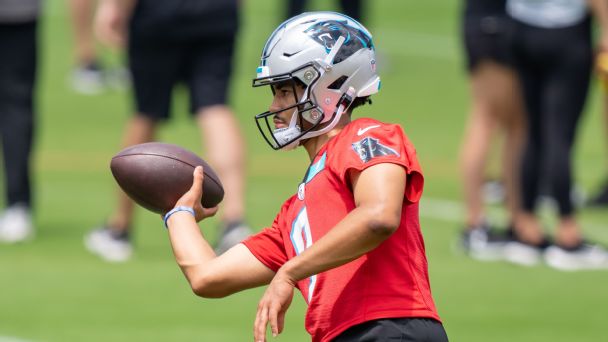The Falcons are embracing a youth movement on offense

Field Yates explains why the Falcons taking Bijan Robinson is the right move for their offense. (1:53)
FLOWERY BRANCH, Ga. — Jonnu Smith walked into his first meeting with the Atlanta Falcons earlier this spring, looked around the tight end position room and had a moment of realization. Smith is entering his seventh season and is still only 27 years old.
What he figured out momentarily startled him: Other than Parker Hesse, who is three months older than him and far less experienced in the NFL, Smith was the oldest player there.
“That’s a really young room,” Smith said.
The tight end room mirrors much of Atlanta’s offense. Between the draft and the reshuffling of the roster over the past two-plus years under general manager Terry Fontenot and head coach Arthur Smith, the Falcons have ended up with an exceedingly young offense entering 2023.
Based on projected starters for Week 1, Atlanta’s average offensive age would be 24.9 years old, making it younger than any Week 1 offense in the league in 2022 or 2021, based on numbers provided by Elias Sports Bureau. This projects second-round pick Matthew Bergeron at left guard and a two-tight end set of Smith and Kyle Pitts.
If Matt Hennessy wins the left guard job, it would nudge the number up to 25.18 years old, making Atlanta’s offense slightly older than the Pittsburgh Steelers’ offense last season (25.0 years old) and the Miami Dolphins’ offense in 2021 (25.16 years old), which were both the youngest in the league.
There are moves which can change the numbers between now and when Atlanta starts its season against the Carolina Panthers on Sept. 10 to alter the average age a little bit, but the overarching point remains: The Falcons are in the midst of a youth movement — with their core skill position players and quarterback almost all under the age of 25.
“For us, it’s just about building this team together,” quarterback Desmond Ridder said. “Building it from what it was last year and Kyle the year before and then each year, it’s improving every single year.”
• Minicamp storylines: Testing rookie QBs
• Parsons ready for ‘year to remember’
• Falcons embracing youth movement
• Is D-Hop a good fit with Patriots
• Jets ready to silence doubters
The youth starts with Ridder, who will be 24 when the season starts. Running backs Tyler Allgeier (23) and rookie Bijan Robinson (21) have one year of experience between them and could be the one-two combination in the backfield. Last year’s first-round pick, Drake London, is 22 and Pitts, entering his third season, is 23. Ridder ended last season as Atlanta’s starting quarterback, Allgeier its leading rusher and London its leading receiver — all as rookies.
Only Smith, who turns 28 in August, is over 25 among the projected skill starters.
Of all the offensive players on the Falcons roster, only six are entering their age 30 season or older, including baseball player-turned-quarterback Austin Aune, a rookie turning 30 in September. Only one clear starter, left tackle Jake Matthews, is over 30 (he’s 31).
Of the skill position players on the roster, only fullback Keith Smith (31), quarterbacks Taylor Heinicke (30) and Aune (30), and running back Cordarrelle Patterson (32) will be over 30 in Week 1.
“Sounds like a lot of young, fresh energy to me,” receivers coach T.J. Yates said. “That’s probably the best way I can explain it. We don’t have a very veteran-type offense, a lot of veteran players, but that’s not necessarily a bad thing.”
Why did the Falcons go young on offense? Some of it is because of the situation Fontenot and Smith took over: A lot of older players throughout the roster with big contracts needing to cycle through, leaving Atlanta in a salary cap conundrum in 2021 and 2022. There’s also how Atlanta drafted. Its three first round picks under Arthur Smith and Fontenot were a tight end (Pitts), a receiver (London) and a running back (Robinson).
Arthur Smith explained it in a financial, business sense.
“It’s like a pie,” Smith said. “Where are you going to split it up is where you’re going to invest.”
The younger investments (read: draft picks) went to the skill positions. The offensive money — for now — went to the line, where Matthews is on his third contract with tackle Kaleb McGary and guard Chris Lindstrom on second contracts they signed in March. The Falcons also placed more free agent money into fixing their defense — a unit last in the league in sacks the last two seasons — by signing veterans on the line, at linebacker and in the secondary.
For now, though, Atlanta’s youth is in its offense, something the Falcons believe in.
“We are a young core at that,” London said. “But I think at the same time, it’s to our advantage, you know.
“We should be on the go, 24/7.”